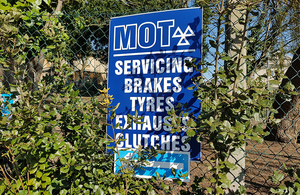Government committed to MOT modernisation as consultation concludes
First MOT test to remain at 3 years from registration and annually thereafter while government works to establish a programme of longer-term reform for MOTs.

- first MOT test to remain 3 years after buying new cars, as government listens to drivers
- government to explore modernising the test for electric and automated vehicles following extensive feedback
- follows the biggest ever investment to improve local roads of £8.3 billion
Motorists will still take the first MOT test 3 years after buying their new car as the government continues to listen to drivers.
Today (25 January 2024), the government has published its response to the consultation on updating MOT testing for cars, motorbikes and vans, which confirms that the first MOT will remain at 3 years from registration. Every subsequent MOT will also continue to be taken once every year, ensuring motorists can continue to drive with peace of mind.
Launched in January 2023, the consultation sought views to ensure roadworthiness checks continue to balance the cost to motorists, road safety, advances in vehicle technology and tackling vehicle emissions.
To ensure MOTs are fit for the future, the government will further investigate how to better monitor diesel vehicle emissions through the Driver and Vehicle Standards Agency (DVSA). This will include whether testing should do more to ensure that diesel vehicles comply with emissions regulations.
Analysis from the AA suggests that an annual MOT can potentially save drivers between £200 and £400 as picking up developing faults each year means drivers aren’t hit with higher repair bills further down the road.
Roads Minister, Guy Opperman, said:
We have listened to drivers and industry, and keeping MOTs in their current form shows once again that we are on the side of motorists.
By offering clarity on MOT tests, alongside our recent street works consultation and unprecedented £8.3 billion to resurface roads, we are helping motorists drive with peace of mind and ensuring Britain’s roads continue to be some of the safest in the world.
With the constantly improving technology of modern-day cars and electric vehicles (EVs), the Department for Transport will continue to work closely with industry stakeholders and drivers to establish a programme of longer-term reform for MOTs.
To ensure they remain fit for the future, the government is exploring a more effective test for diesel particulate emissions, whether further improvements could be made to the MOT for electric vehicles and the transfer of some larger zero-emissions vans to more standard, car-style MOT testing.
Neil Barlow, Head of Vehicle Policy at DVSA, said:
Ensuring the MOT remains fit for the future is a key part of DVSA’s work and getting ready for new technology will help keep Britain’s roads safe.
We hope, this positive news will provide some certainty for garages to enable the investment in new technologies that could be needed to keep the MOT at the forefront of road safety and the environment.
DfT will also monitor technological developments that could require an altered MOT, such as advanced driver assistance systems.
Jakob Pfaudler, AA CEO, said:
AA polling showed drivers overwhelmingly (83%) supported the annual MOT for keeping their cars and other cars safe. With 1 in 10 cars failing their first MOT, we fully support the government’s pragmatic decision to maintain the first MOT at 3 years and annually thereafter.
The measures follow last week’s proposals to tackle overrunning street works from utility companies and the biggest ever funding boost of £8.3 billion to resurface over 5,000 miles of local roads in England, as the government continues to be on the side of drivers and improve journeys for more people, in more places, more quickly.
Mike Hawes, SMMT Chief Executive, said:
Government and the automotive industry have worked together to ensure the UK has some of the world’s safest roads. The decision to retain the existing MOT system is the right one, helping maintain this proud record and giving drivers confidence in car and van roadworthiness.
With vehicle technology continuing to evolve at pace in terms of both safety and environmental performance, we will maintain this collaboration with government and other stakeholders so that the MOT continues to be fit for purpose, helping Britain improve what is already a strong road safety record.
IAM RoadSmart Director of Policy and Standards, Nicholas Lyes, said:
An MOT gives drivers confidence their vehicle is conforming to minimum roadworthiness standards and many see it as an essential technical health check. Well-maintained vehicles make our roads safer and reduce the chances of collisions caused by worn-out parts and more serious defects.
We welcome the government listening to drivers and prioritising both road safety and emissions as part of this package of announcements.
Roads media enquiries
Media enquiries 0300 7777 878
Switchboard 0300 330 3000